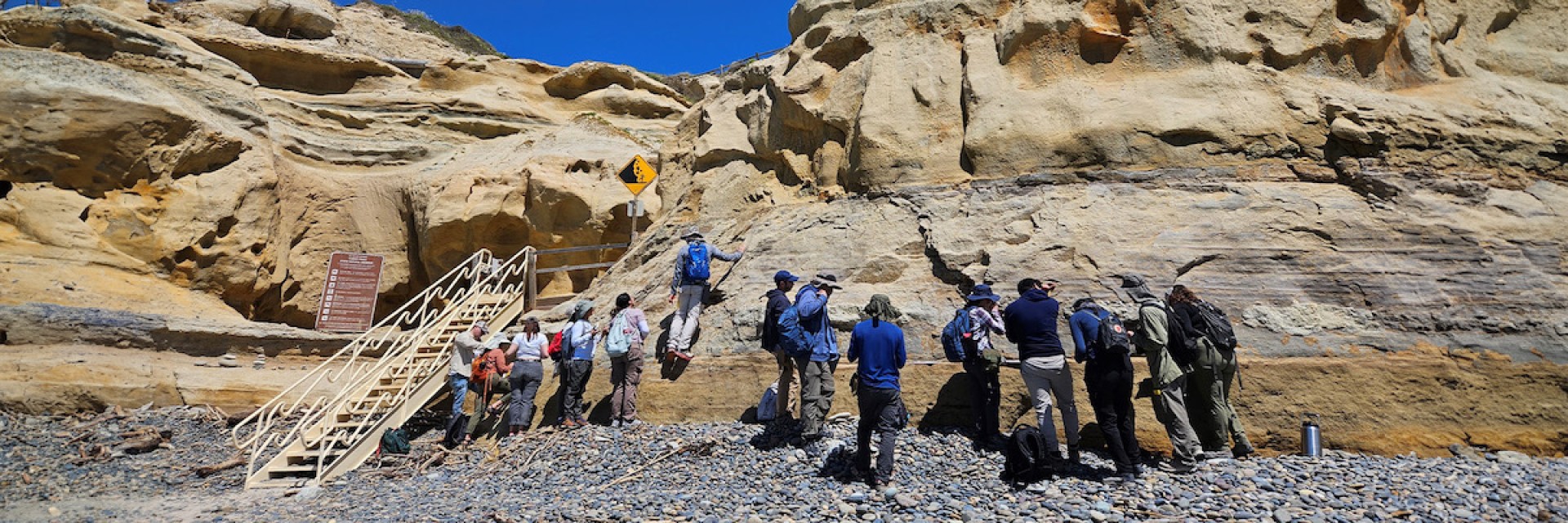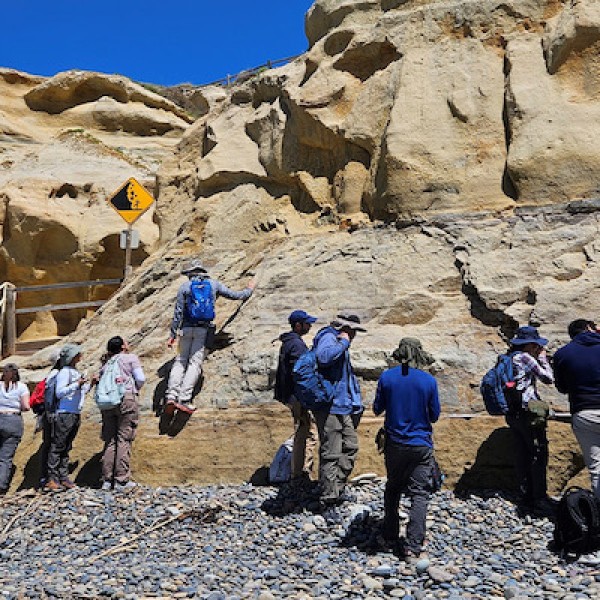Master's Degree Program with a Focus on Hydrogeology and Environmental Geochemistry
US Department of Education recently funded the expansion of the Hydrogeology Program through the FIPSE program (Funds for the Improvement of Post Secondary Education). Cal State LA is committed to education in hydrogeology because water resource management is one of the critical issues that we as a society will be challenged with for years to come. Apart from ensuring sustainable water supplies for a growing population, we are faced with protecting our water resources from contamination (natural and anthropogenic) . Furthermore, climate models predict that certain regions such as, southwestern United States will likely see a drier climate. All of the above will require a workforce that is prepared to address these issues armed with the appropriate skills. Learn more about the FIPSE program and Cal State LA's role in hydrogeology education.
Hydrogeology Program Requirements
Since1978, the Department of Geological Sciences has offered a Master's Degree Curriculum that integrates coursework and research in Hydrogeology, Groundwater Management, and Environmental Geochemistry, providing the necessary foundation for students seeking employment in the geosciences and eventual State of California certification as registered hydrogeologists and engineering geologists. The program accommodates working students by offering required upper division and graduate-level courses in the late afternoon and early evening. The curriculum is academically rigorous, as exemplified by former students who either have completed their Doctorate at institutions such as the University of California, University of Southern California, and Stanford University or are currently enrolled in the Doctoral Program at these institutions.
Master's Degree Candidates may select either a Thesis or Comprehensive Examination. The philosophy of the Department has been to encourage independent research, hence, the Comprehensive Examination Option also includes a research project. Both options include an oral defense of the Thesis or Research Project to a three member Faculty Committee. A total of 45 quarter units are required to complete either option.
Students who enter the program without a Bachelors Degree in geological sciences or other appropriate science or engineering training are required to complete a makeup program. This program is designed to prepare you specifically for success in hydrogeology.
You may learn more about the Hydrogeology Option by referring to the Graduate Program and the University Catalog.
University Setting and Master's Degree Collaboration
California State University, Los Angeles is an urban campus situated near agricultural, desert, and coastal environments. As a result, students have the opportunity to select research topics from a variety of hydrogeologic and/or geochemical settings for their Master's Degree investigation. Faculty-private sector relationships (eg. industry, various government agencies) have been developed to allow students to perform research of a practical nature and ultimately provide the professional community, through Master's Degree research, with interpretations of data pertaining to problems of interest in the region. These joint efforts have been advantageous for students who typically seek employment after graduation with the environmental consulting firms, geotechnical firms, government agencies, or regulatory boards who collaborated with them on their Master's Degree project.
Recent Hydrogeology and Environmental Geochemistry Master's Degree Topics:
- Geochemical and Isotopic Evidence for In-Situ Bioremediation.
- Groundwater Basin Management, Canada Gobermadora, Orange County, California
- Application of a Dual-Bounded, Unconfined Aquifer Model, Santa Ana River Canyon, California
- Hydrogeochemical Modeling of Groundwater Flowpaths in a Karst Terrane, Lees Summit, Missouri
- Sources of Nitrate Contamination, Orange County
- Seasonal Fluctuations in Groundwater Nitrate Levels, Oxnard Plain, California
- Modeling Reclaimed Water Recharge in Groundwater Aquifers via Geochemical Tracers
- Groundwater Elevation Fluctuations using Ground Penetrating Radar
- Biodegradation of Chlorinated Hydrocarbons, San Gabriel Valley Superfund Site
Faculty Areas of Expertise: Hydrogeology and Environmental Geochemistry
Andre Ellis, Ph.D., 2003, Ph.D., University of Illinois:
Environmental isotope hydrogeology and geochemistry.
Barry J. Hibbs, Ph.D., 1993, University of Texas, Austin:
Hydrogeology; numerical flow/solute transport modeling, contaminant hydrogeology, wetlands hydrology, environmental geophysics.
Richard W. Hurst, Ph.D., 1975, UCLA:
Hydrogeochemistry; stable and radiogenic isotopes, environmental forensics, organic and inorganic geochemistry, contaminant transport.
Mohammad Hassan Rezaie-Boroon, 1997, Ph.D., University of Erlangen-Nuremberg, Ph.D.:
Hydrogeology; environmental geochemistry.
Faculty in Related Areas
Kim M. Bishop, Ph.D., 1994, USC
Engineering Geology; soil mechanics, mass movement, structural geology.
Department Faculty Receive Grants
Dr. Andre Ellis was recently awarded a 2 year research grant of $163,000 from the National Science Foundation. This grant will support Dr. Ellis' groundbreaking work on chromium isotope systematics at environmental sites.
Dr. Barry Hibbs recently received a 2 year research grant of $250,000 from the US Department of Education to support curriculum development in hydrogeology and to support MS student research. Topics include southwestern water sustainability topics, water security, and hydrological analysis along the US/Mexico border. Dr. Hibbs also received a renewal of his annual water quality monitoring contract for the Santa Monica Mountains ($70,000) from the US National Park Service.
Hydrogeology & Environmental Geochemistry Courses
Upper Division/Graduate Courses
- GEOL 422 Environmental & Forensic Geochemistry
- GEOL 424 Low Temperature Geochemistry
- GEOL 425 Isotope Geology
- GEOL 484 Hydrogeology
- GEOL 485 Groundwater Models & Management
- GEOL 486 Environmental & Engineering Geophysics
- GEOL 490 Special Topics in Geology*
Graduate Courses
- GEOL 560 Hydrogeology
- GEOL 561 Vadose Zone Hydrogeology
- GEOL 562 Contaminant Hydrogeology
- GEOL 563 Water Quality Seminar
- GEOL 570 Special Topics *
- GEOL 581 Engineering Geology
- GEOL 584 Paleoseismology
- GEOL 585 Landslides, Avalanches, and Debris Flows
- GEOL 597 Graduate Research
- GEOL 598 Graduate Directed Study
- GEOL 599 Thesis
*Examples of issues addressed in Special Topics Courses and Seminars include: Water Resources Management, Geology and Geochemistry of Landfills, Hydrogeochemistry Field Methods Upper Division and Graduate Courses are offered on an alternate year basis or upon student demand in the case of Special Topics Courses.
Facilities & Equipment
Laboratories Wet
Chemistry Laboratory; Sedimentological Flume Laboratory; Soils Analysis Laboratory; Computer Laboratories.
Equipment
Hach Portable Datalogging Spectrophotometer; Marsh McBirney Flowmeters (3); Grundfos Pump; Isco Autosamplers (3); Dionex Ion Chromatographs (2); Turner Designs Fluormeter; Hach Turbidimeters (2); Orion ISE/ORP Meter Bison Geopro, 12-Channel Reflection/Refraction Seismograph; Advanced Geocsciences Earth Resistivity Meter; Guelph Permeameter; Tensiometers; Suction Lysimeters; Soil Sampling Augers; Streamflow Measuring Meters; Well Sampling Equipment; Pressure Transducers; and Data loggers; Consolidometer; Direct Shear Instrument; and a Full Suite of Groundwater/Hydrochemical Software
Financial Assistance
The Department of Geological Sciences offers support to help defray the costs of tuition, or graduate thesis research expenses. At present, graduate students are eligible to apply for scholarships listed below (intent or restrictions are shown in parentheses). Additional financial support may be available through the Office of Financial Assistance, Student Affairs Building, Room 124. To be eligible for any scholarship, an application must be filed with the Office of Scholarships and Financial Assistance in the Student Affairs Building Room 124.
Robert Bean Scholarship (Hydrogeology)
Chance-Dana Award (Outstanding Students)
Robert Stone Scholarship (Thesis Expenses)
Martin Stout Scholarship (Outstanding Promise)
SFOS Fellowship
Application Information
Students with a Bachelor's Degree from another institution must submit an application for admission to the University, official transcripts showing all prior academic work from every college or university attended, a Departmental application, and three letters of recommendation sent to the Department of Geological Sciences. Information is available from the Office of Admission and University Outreach (323-343-3901) and from the Department of Geological Sciences Graduate Advisor.

